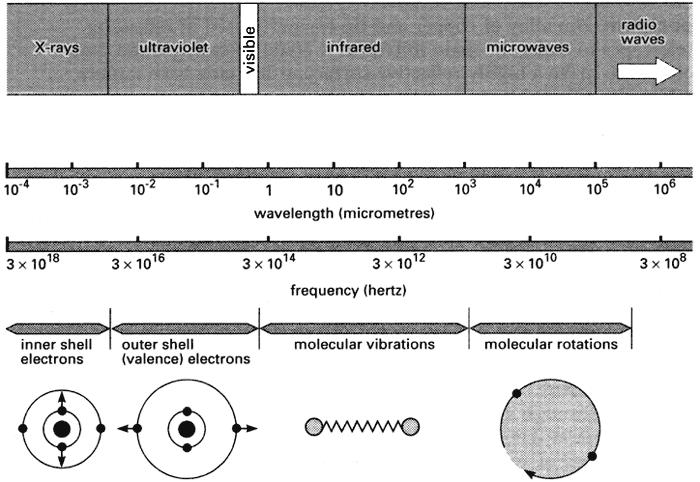1 A distribution of entities or properties arrayed in order of increasing or decreasing magnitude. For example, a beam of ions passed through a mass spectrograph, in which they are deflected according to their charge-to-mass ratios, will have a range of masses called a mass spectrum . A sound spectrum is the distribution of energy over a range of frequencies of a particular source.
2 A range of electromagnetic energies arrayed in order of increasing or decreasing wavelength or frequency (see electromagnetic spectrum). The emission spectrum of a body or substance is the characteristic range of radiations it emits when it is heated, bombarded by electrons or ions, or absorbs photons. The absorption spectrum of a substance is produced by examining, through the substance and through a spectroscope, a continuous spectrum of radiation. The energies removed from the continous spectrum by the absorbing medium show up as black lines or bands. With a substance capable of emitting a spectrum, these are in exactly the same positions in the spectrum as some of the lines and bands in the emission spectrum.
Emission and absorption spectra may show a continuous spectrum , a line spectrum , or a band spectrum . A continuous spectrum contains an unbroken sequence of frequencies over a relatively wide range; it is produced by incandescent solids, liquids, and compressed gases. Line spectra are discontinuous lines produced by excited atoms and ions as they fall back to a lower energy level. Band spectra (closely grouped bands of lines) are characteristic of molecular gases or chemical compounds. See also spectroscopy.

Spectrum: sources of electromagnetic spectra
- angstrom
- Angström, Anders Jonas
- angular displacement, velocity, and acceleration
- angular frequency
- angular magnification
- angular momentum
- anharmonic oscillator
- anion
- anisotropic
- annealing
- annihilation
- annulus
- anode
- anomaly
- ANSI
- antenna
- anthropic principle
- antiatom
- antiferromagnetism
- antilogarithm
- antimatter
- antinode
- antiparallel spins
- antiparallel vectors
- antiparticle